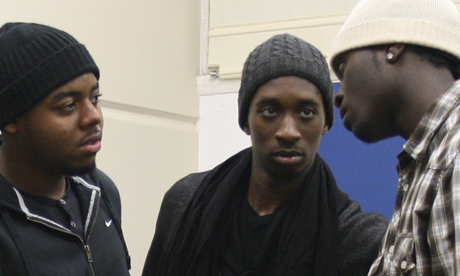Crime plays at the Hackney Empire

“Everyone’s got a lot of stories to bring to the piece”
Panopticism is a play by a London-wide youth project, ‘Weapon of Choice’, which focuses on the issues that surround gun and knife crime.
Zephryn Taitte, one of the play’s directors, explains that the play is about choice and looking at the consequences of our actions.
“Everyone has that choice and that freedom about whether to pick up a knife or a gun,” he says.
Says Jovou Toriano Lennon from Hackney, “Everyone’s got a lot of stories to bring to the piece. We’re showing the reality of it, we’re showing it from different perspectives, from the criminal’s point of view, a victim’s point of view, the mother’s, sister’s, brother’s, and police point of view.”
Ashden Oke, a member of the cast from Hackney, plays with philosopher Michel Foucault’s original idea of ‘panopticism’ as ubiquitous surveillance.
“We are constantly being watched, whether this is by friends, family, acquaintances, the police or being caught on film by CCTV or the media,” he says.
Ashden sees hierarchy and control as simple facts to be acknowledged. What is important, he states, is to show the relationships between “police officers, mums and dads, older sisters, people with authority and the kids themselves that make up the back-story to gun and knife crime”.
Power-holders are in control of the social order, to some extent, and this power can control other individual’s actions.
Media coverage affects how gun and knife crime is perceived too.
“Most of the stuff that happens on the streets is not in the newspapers, on the radio, on the internet,” Ashden tells me. News stories don’t always provide the context of the culture in which these crimes take place.
“Sometimes they broadcast just one side of the gun and knife crime situation, so there could be a back-story but they don’t know.
“The thing with gun and knife crime is you don’t have to do it yourself to be involved.”
Ashden confides a part of his own background when he says, “I’ve lived in Hackney since I was two. I know a lot of people who are still trapped within gun and knife crime. I already know what it’s like out there.”
Young people from nine different boroughs, many of them with direct experience of gun and knife crime, have come together to share their experiences and perform them as a collaborative and improvised piece.
The play explores how one boy’s actions at Notting Hill Carnival affect a group of nine friends’ lives within the mix. What happened before each individual ended up in the carnival and the whole incident occurred?
The play reveals this particular story and takes a look at the wide range of relationships that are brought into conflict through this incident.
Panopticism explores how far back this choice goes and how many people are caught up in the cross-fire. The result is an attention-grabbing and thought-provoking journey through the different relationships that are thrown into conflict because of one boy’s actions.
Taitte explains that he wanted to challenge the actors, to give them a basic idea to work with and allow them to feel their way into the scenes. The cast feel that the play’s unscripted nature means that they can react honestly to the situations they are presented with.
Although the cast have a shared desire to make change, they do not pretend to have all the answers. Instead, they raise questions by presenting a narrative that moves through extreme tension and emotion in a subtle and engaging way.
Panopticism is coming to schools and community centres in Hackney in December. It will also be running for two nights at the Hackney Empire on 8 and 9 December.
